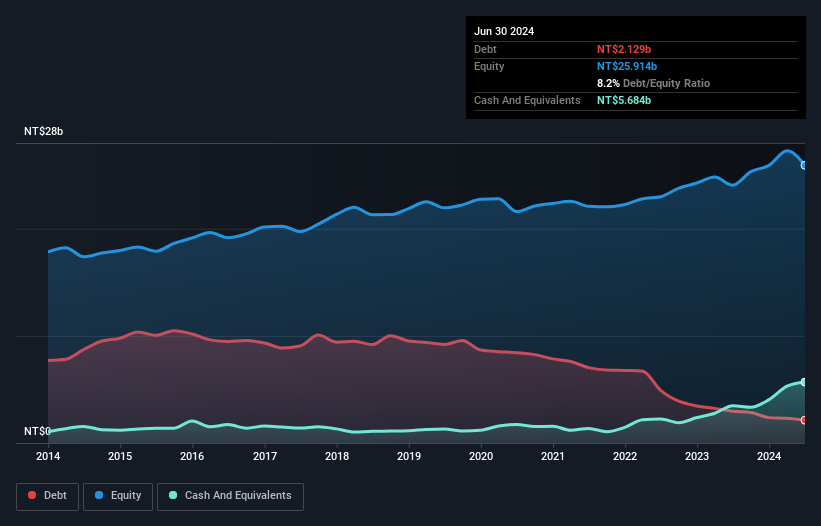- Taiwan
- /
- Auto Components
- /
- TWSE:1319
These 4 Measures Indicate That Tong Yang Industry (TWSE:1319) Is Using Debt Safely
The external fund manager backed by Berkshire Hathaway's Charlie Munger, Li Lu, makes no bones about it when he says 'The biggest investment risk is not the volatility of prices, but whether you will suffer a permanent loss of capital.' So it might be obvious that you need to consider debt, when you think about how risky any given stock is, because too much debt can sink a company. Importantly, Tong Yang Industry Co., Ltd. (TWSE:1319) does carry debt. But the more important question is: how much risk is that debt creating?
Why Does Debt Bring Risk?
Generally speaking, debt only becomes a real problem when a company can't easily pay it off, either by raising capital or with its own cash flow. Ultimately, if the company can't fulfill its legal obligations to repay debt, shareholders could walk away with nothing. However, a more usual (but still expensive) situation is where a company must dilute shareholders at a cheap share price simply to get debt under control. By replacing dilution, though, debt can be an extremely good tool for businesses that need capital to invest in growth at high rates of return. The first step when considering a company's debt levels is to consider its cash and debt together.
Check out our latest analysis for Tong Yang Industry
How Much Debt Does Tong Yang Industry Carry?
As you can see below, Tong Yang Industry had NT$2.13b of debt at June 2024, down from NT$2.97b a year prior. However, its balance sheet shows it holds NT$5.68b in cash, so it actually has NT$3.55b net cash.

How Healthy Is Tong Yang Industry's Balance Sheet?
Zooming in on the latest balance sheet data, we can see that Tong Yang Industry had liabilities of NT$8.74b due within 12 months and liabilities of NT$1.89b due beyond that. On the other hand, it had cash of NT$5.68b and NT$4.96b worth of receivables due within a year. So its total liabilities are just about perfectly matched by its shorter-term, liquid assets.
Having regard to Tong Yang Industry's size, it seems that its liquid assets are well balanced with its total liabilities. So while it's hard to imagine that the NT$63.0b company is struggling for cash, we still think it's worth monitoring its balance sheet. Simply put, the fact that Tong Yang Industry has more cash than debt is arguably a good indication that it can manage its debt safely.
On top of that, Tong Yang Industry grew its EBIT by 67% over the last twelve months, and that growth will make it easier to handle its debt. When analysing debt levels, the balance sheet is the obvious place to start. But ultimately the future profitability of the business will decide if Tong Yang Industry can strengthen its balance sheet over time. So if you want to see what the professionals think, you might find this free report on analyst profit forecasts to be interesting.
Finally, a business needs free cash flow to pay off debt; accounting profits just don't cut it. Tong Yang Industry may have net cash on the balance sheet, but it is still interesting to look at how well the business converts its earnings before interest and tax (EBIT) to free cash flow, because that will influence both its need for, and its capacity to manage debt. Happily for any shareholders, Tong Yang Industry actually produced more free cash flow than EBIT over the last three years. That sort of strong cash conversion gets us as excited as the crowd when the beat drops at a Daft Punk concert.
Summing Up
While we empathize with investors who find debt concerning, you should keep in mind that Tong Yang Industry has net cash of NT$3.55b, as well as more liquid assets than liabilities. The cherry on top was that in converted 123% of that EBIT to free cash flow, bringing in NT$4.2b. So we don't think Tong Yang Industry's use of debt is risky. There's no doubt that we learn most about debt from the balance sheet. But ultimately, every company can contain risks that exist outside of the balance sheet. For example, we've discovered 1 warning sign for Tong Yang Industry that you should be aware of before investing here.
If you're interested in investing in businesses that can grow profits without the burden of debt, then check out this free list of growing businesses that have net cash on the balance sheet.
Valuation is complex, but we're here to simplify it.
Discover if Tong Yang Industry might be undervalued or overvalued with our detailed analysis, featuring fair value estimates, potential risks, dividends, insider trades, and its financial condition.
Access Free AnalysisHave feedback on this article? Concerned about the content? Get in touch with us directly. Alternatively, email editorial-team (at) simplywallst.com.
This article by Simply Wall St is general in nature. We provide commentary based on historical data and analyst forecasts only using an unbiased methodology and our articles are not intended to be financial advice. It does not constitute a recommendation to buy or sell any stock, and does not take account of your objectives, or your financial situation. We aim to bring you long-term focused analysis driven by fundamental data. Note that our analysis may not factor in the latest price-sensitive company announcements or qualitative material. Simply Wall St has no position in any stocks mentioned.
About TWSE:1319
Tong Yang Industry
Engages in the manufacture and sale of parts, components, and models for automobile in Taiwan, China, the United States, and internationally.
Flawless balance sheet and undervalued.
Similar Companies
Market Insights
Community Narratives



